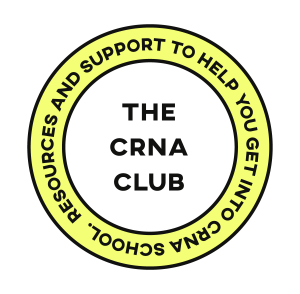The road to becoming a Certified Registered Nurse Anesthetist (CRNA) is challenging, and CRNA school admissions are highly competitive. Whether you're just beginning the process or deep into your application journey, focusing on these five key areas will significantly enhance your chances of getting accepted. Let’s dive into the essential components of a strong CRNA school application.
1. Showcase Your Academic Strength: GPA, Courses, and Certifications
Even if your undergraduate GPA isn’t stellar, you can still prove your academic capability by taking the right steps.
Tips to Strengthen Your Academic Profile:
- Boost Your GPA: If your GPA is below a 3.5, retake core science courses (e.g., anatomy, physiology, microbiology) and aim for A’s.
- Enroll in Graduate-Level Courses: Consider taking courses like advanced pathophysiology or pharmacology as a non-degree student. Performing well in these graduate courses shows admissions committees that you can handle the CRNA program requirements.
- Certifications: Sit for relevant certification exams like the CCRN. Scoring well demonstrates your mastery of critical care knowledge and highlights your dedication to professional development.
- GRE Prep: If required, aim for a GRE score in the 50th percentile or above. This shows your ability to handle the rigorous academic demands of CRNA school.
By proactively addressing academic gaps, you can position yourself as a strong candidate, even if your GPA is not perfect.
2. Highlight Your Critical Care Experience: The Heart of CRNA Applications
One of the most critical aspects of your application is your critical care experience. CRNA programs expect candidates to have hands-on experience with high-acuity patients.
What CRNA Schools Look for in Critical Care Experience:
- High-Acuity ICU Experience: Programs prefer applicants with experience in adult ICU, NICU, or PICU. Your time in these settings should include managing mechanically ventilated patients and titrating multiple vasopressors.
- Advanced Skills: Highlight your ability to handle life-saving treatments like CRRT (continuous renal replacement therapy), ECMO, or invasive monitoring (e.g., arterial lines, ICP monitoring).
- Complex Case Management: Demonstrate your experience managing complex cases, responding to clinical emergencies, and performing advanced assessments.
Admissions committees want to know that you are comfortable working with critically ill patients, and your experience here is a crucial part of that assessment.
3. Demonstrate Leadership Skills: Stand Out as a Leader
CRNA schools are not just looking for strong clinicians—they want future leaders in the field.
Ways to Showcase Leadership:
- Take Charge at Work: Whether it’s acting as a charge nurse, precepting new nurses, or leading quality improvement projects, taking on leadership roles within your unit shows initiative and responsibility.
- Hospital Committees: Join or even lead hospital committees where you can contribute to improving policies or procedures.
- Mentoring and Education: Be a mentor or educator for newer nurses, showcasing your ability to guide and influence others.
Effective leadership in nursing is a key indicator of your ability to handle the responsibilities of a CRNA, and it’s something that admissions committees look for in candidates.
4. Professional Involvement: Get Involved in the CRNA Community
Involvement in professional organizations is an important part of how to get into CRNA school and demonstrates your dedication to the profession.
Engage with the Nurse Anesthesia Field:
- Join Professional Organizations: Become a member of groups like the American Association of Nurse Anesthetists (AANA) and your state nurse anesthetist association.
- Attend Conferences: Attend local and national AANA meetings, where you can network with current CRNAs, program faculty, and peers. This is also a great way to stay updated on the latest trends in nurse anesthesia.
- Volunteer: Offer to help with committees or task forces in these organizations. This shows that you are an active participant in advancing the profession.
Being involved in professional organizations signals to admissions committees that you are committed to staying active and contributing to the growth of the nurse anesthesia field.
5. Community Involvement and Giving Back: Show Your Compassion
CRNAs are more than just skilled clinicians—they are also dedicated community members who give back.
Ways to Highlight Community Service:
- Volunteer Work: Whether it’s volunteering at local clinics or participating in medical missions, showing that you give back to your community adds a compassionate dimension to your application.
- Charitable Involvement: Highlight any involvement in nonprofit organizations or health initiatives that align with your values as a healthcare professional.
CRNA programs value candidates who are not only excellent clinicians but also compassionate individuals dedicated to improving healthcare and giving back to their communities.
Conclusion: Check These 5 Boxes to Boost Your CRNA School Application
By focusing on your academic strength, critical care experience, leadership abilities, professional involvement, and community service, you can build a compelling and competitive application. Remember, it’s about more than just meeting the CRNA school requirements—you need to demonstrate that you are a well-rounded, committed candidate who is ready for the challenges of nurse anesthesia school.
Ready to boost your application?
Watch our free 30-Minute Masterclass on "How to Become a Competitive CRNA School Applicant" and get expert insights on crafting the perfect CRNA school application. You can also download our free guide for more tips on how to stand out from the crowd!


